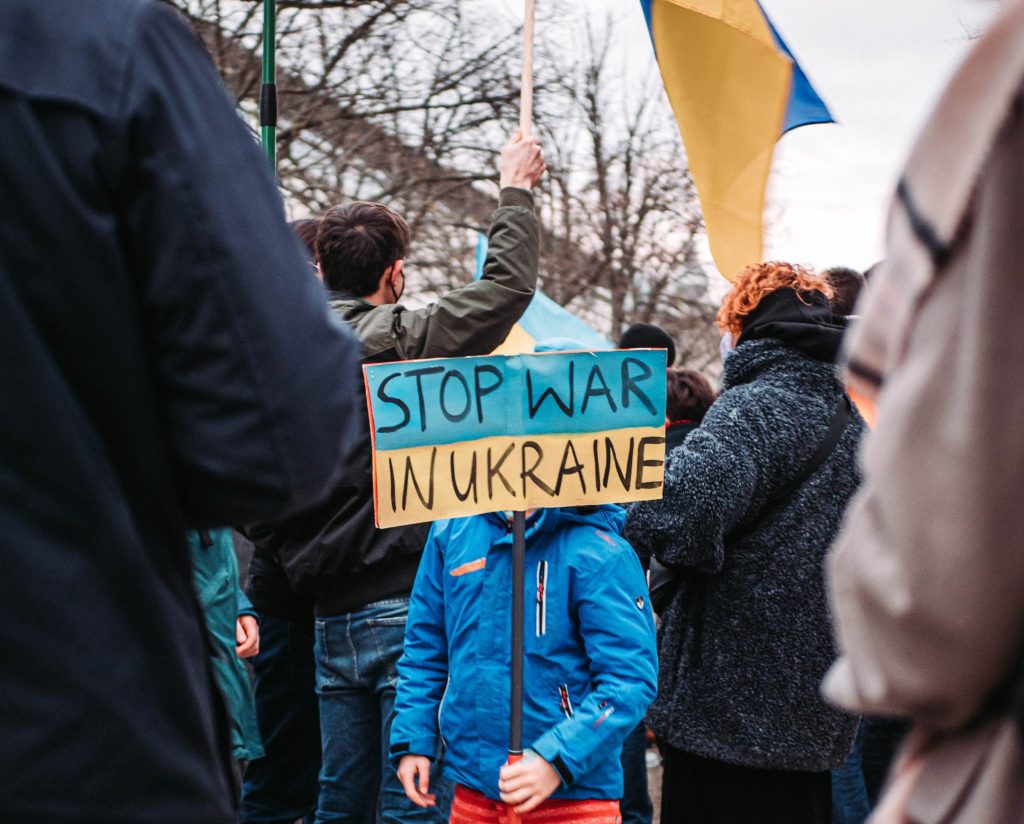The International Day of Peace celebrated on the 21st of September comes as a reminder to continue promoting peace and supporting justice in Ukraine. In 2023, The Hague Academy worked with participants from various public institutions in Ukraine. The aim was to strengthen their capacities to undertake the processes and mechanisms required for transitional justice. Read how expert Asa Solway reflects on the role of transitional justice in the future of Ukraine.

A Kid Protesting against the War in Ukraine, 2022. Free Stock Photo by Matti Karstedt.
The International Day of Peace
The 2023 International Day of Peace marks 574 days since the full-scale Russian invasion of Ukraine and nine years since Russian troops first entered Ukrainian territory in 2014. It also coincides with the mid-point year of the global implementation of the Sustainable Development Goals.
While a seemingly ironic reminder when commemorating the International Day of Peace, it is crucial to acknowledge the importance of planning for peace. In line with this year’s theme of Actions for Peace: Our Ambition for the Sustainable Development Goals, we hope to see a re-establishment of peace, rule of law, and good governance in Ukraine, and to support its continued development.
Supporting Transitional Justice in Ukraine
In 2023, The Hague Academy developed a Training of Trainers session on transitional justice for Ukrainian civil servants. Additionally, we developed an online module on the same topic, aiming to assist Ukrainian civil servants in managing transitional justice processes, including providing justice for victims, rebuilding transparent and accessible institutions, and promoting public dialogue and reconciliation. This online self-paced module, developed in the Ukrainian language, is especially relevant for civil servants in recently liberated towns, or areas near the frontlines, as well as for civil servants in towns and communities with high numbers of IDPs. The training is also relevant for volunteers active near the frontlines or who engage with IDPs. These activities were part of the MATRA programme, implemented in Ukraine (2017 – 2023) with funds from the Dutch Ministry of Foreign Affairs.
Asa Solway, the Co-Director of UpRights, an NGO that builds partnerships to promote human rights, was the lead expert of the session. Sitting down with Asa, we explore the role transitional justice has to play now and the future of Ukraine.
Transitional Justice
Transitional Justice refers to the processes and mechanisms used to address human rights violations committed during periods of conflict. As Asa explains, “One way to think about it is as a toolkit designed to help societies confront the aftermath of large-scale past conflicts, repressions, violations, or abuses”.
A transitional justice process largely focuses on delivering justice for past crimes, strengthening the rule of law, and ensuring reconciliation between communities through a victim-centred approach.
Asa identified four specific engagement categories to help realise these goals: 1) ensuring accountability for the perpetrators of crimes; 2) pursuing reparations for victims; 3) strengthening trust in the rule of law; and 4) promoting reconciliation. Each objective is meant to help incorporate diverse perspectives to overcome violent legacies and build a more resilient, just, and peaceful society capable of preventing future conflict.
Perspectives from the Training
“The international community has thus far given significant attention to ensuring accountability for the mass number of crimes committed. This is of course of deep importance, but accountability is just one facet of an interconnected set of issues that must be addressed to ensure Ukraine and its citizens can overcome the impact of the conflict”.
Ukraine also faces a major challenge related to reinstating the rule of law and trust within communities. A series of key steps will be crucial for this, including offering reparations for the harms suffered during the conflict, ensuring that victims of war have access to justice and can participate in processes of accountability, and supporting communities at large to rebuild institutions that have been weakened by conflict.
These challenges affect all of Ukraine, “but are particularly acute in areas that face temporary or long-term occupation. Different communities will require tailored strategies to tackle the consequences of the conflict”, describes Asa. “There is a repeated and clear concern that civil servants expressed during the training regarding the reintegration of communities – those who left are distrustful of those who stayed, while those who stayed may often resent those who left.”
Transitional justice provides a concrete framework to address this problem and helps to focus on and give a voice to those most affected by conflict, who must be at the centre of the rebuilding process. “The course helped participants recognise common problems, give a name to them, and begin to provide a framework to address these challenges through empirically tested processes”, mentioned Asa.
As he explains, international attention and resources are strong now, but peace and justice will require years, and likely decades, of dedication and commitment.
“I believe that if an organised approach is taken, rooted in the rule of law, communities will have the best chance to begin to rebuild while focusing on those most vulnerable. Ensuring that all communities are a part of this process is also essential to avoiding past mistakes and building stronger bonds to prevent future conflict”.
_______________________________________________
The MATRA programme in Ukraine aims to increase practices of good governance and the rule of law in Ukrainian public institutions, with a special focus on integrity, transparency, accountability, and anti-corruption.
The programme was attended by members of the National Agency of Ukraine on Civil Service (NAUCS), the National Agency for Corruption Prevention (NACP), various Ukrainian ministries, and staff of the Verkhovna Rada – Parliament of Ukraine.
The programme was attended by members of the National Agency of Ukraine on Civil Service (NAUCS), the National Agency for Corruption Prevention (NACP), various Ukrainian ministries, and staff of the Verkhovna Rada – Parliament of Ukraine.
Related courses
We offer a diversity of courses throughout the year. Here are several other courses you might like.

